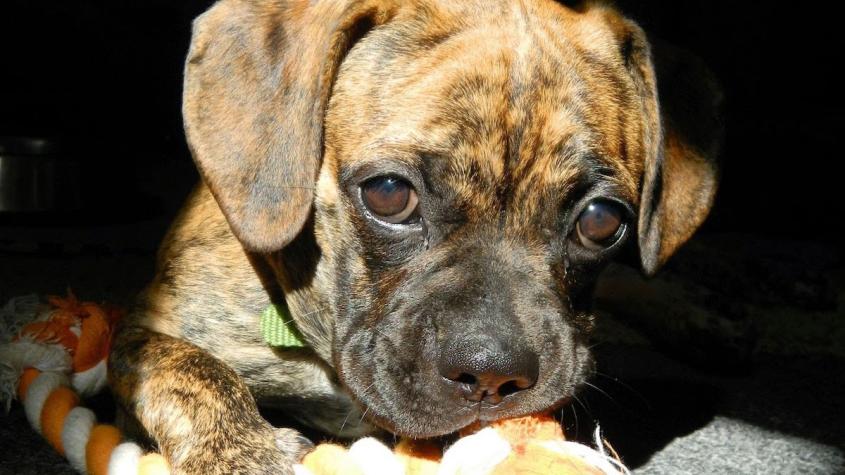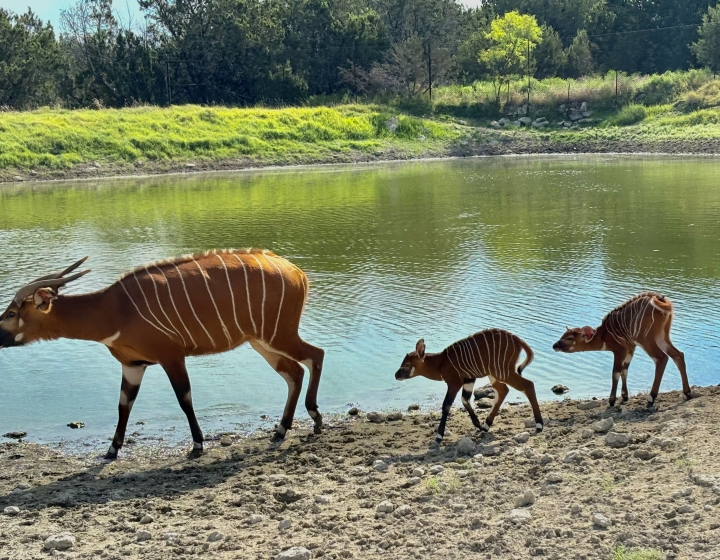“Miracle dog” goes into fifth remission from lymphoma
Medical oncology resident Skylar Sylvester ’14, D.V.M. ’18, first treated Indy, a six-year-old puggle-Boston terrier mix, for lymphoma in 2018 when she was in her fourth year of veterinary school at the Cornell College of Veterinary Medicine.
Sylvester graduated, did a rotating internship at the University of Pennsylvania School of Veterinary Medicine, and returned to Cornell University Hospital for Animals (CUHA) in 2019 to start her medical oncology residency.
“Knowing that the prognosis for lymphomas in dogs is typically about a year after chemotherapy treatment, I said goodbye to Indy before I left for Philadelphia, not expecting her to still be here when I came back,” says Sylvester. “And then when I came back for residency to see her still here and thriving and happy, I was so grateful.”
Indy continues to defy the odds. Over the past three years, she has been treated with different chemotherapies five times and gone into remission each time. She is now nine years old, in her fifth remission, and doing well.
“She’s like a miracle dog,” says Dr. Brittany Zumbo, one of the medical oncology residents who cared for Indy. “No one would have expected her to do as well as she has. She must have a lymphoma that’s just less aggressive and a little bit more responsive to these chemotherapies because she is not building up the typical resistance that we can see when we treat lymphoma over and over again.”
Initially, Indy received the typical chemotherapy protocol for lymphoma — Cyclophosphamide, Hydroxydaunorubicin, Oncovin and Prednisone (CHOP). When she came out of remission a year later, the team tried Tanovea (rabacfosadine), a newer drug and the only one that is FDA-approved specifically for dogs with cancer. Indy had a great response to that, with a six-month remission. Treatment with doxorubicin was next, followed by the MOPP protocol — Mustargen, Oncovin, Procarbazine and Prednisone. When that stopped working, she was put back on the Tanovia.

“We’ve just had a lot of leeway in her treatment,” says Sylvester. “She’s had a variety of what we call ‘rescue’ chemotherapy protocols, which just means that we try something else when one thing stops working.” Currently, Indy sees the doctors at CUHA every other week.
For Indy’s owner Bailey, paying for cancer treatments on and off over the course of three years has been challenging. Even though she and her husband have pet insurance, this doesn’t always cover everything, and reimbursements for up-front costs take time to process.
“When we started Indy’s treatment, I was a grad student,” says Bailey. “Money was tight and it became difficult to pay the bills before we could even submit them to the insurance company. The treatments can get so close together. Depending on which protocol, some of them are like a week apart.”
They asked Indy’s main doctor at the time, Dr. Joshua Henry, about financial options. Henry recommended them for a grant from the Petco Foundation & Blue Buffalo Treatment Support Fund to help defray costs. The Petco Foundation and Blue Buffalo first partnered with Cornell in 2016 to help subsidize cancer therapies for owners who otherwise could not afford them. Since then, the foundation has contributed $575,000 to Cornell, enabling over 200 families to pursue treatments that can be very expensive.
“[Cornell] sent us an application, and we heard back pretty quickly,” says Bailey. “Since then, they've provided assistance on every treatment Indy’s had for the last two years.”
For the oncologists who have treated Indy, it has been buoying on many levels to see her continued response. “We all feel so fortunate to see her grow older because she was only six when she started treatment. It’s nice to see her face going gray,” says Sylvester. Indy’s case shows that in some situations, veterinarians can help make cancer a chronic disease that pets can live with for an extended period of time. “So she’s a great example of that, and one that has touched everyone in our department. She brings a smile to all of our faces.”
Bailey — who calls her pup the “most friendly, most loving, most mischievous dog possible” — says their experience with the oncology department at CUHA has been “just stellar in every imaginable way. They’ve allowed us to have so much more time than we ever believed we could have with Indy. So it’s made a huge difference in her life certainly, and in ours as well.”
Written by Christina Frank





